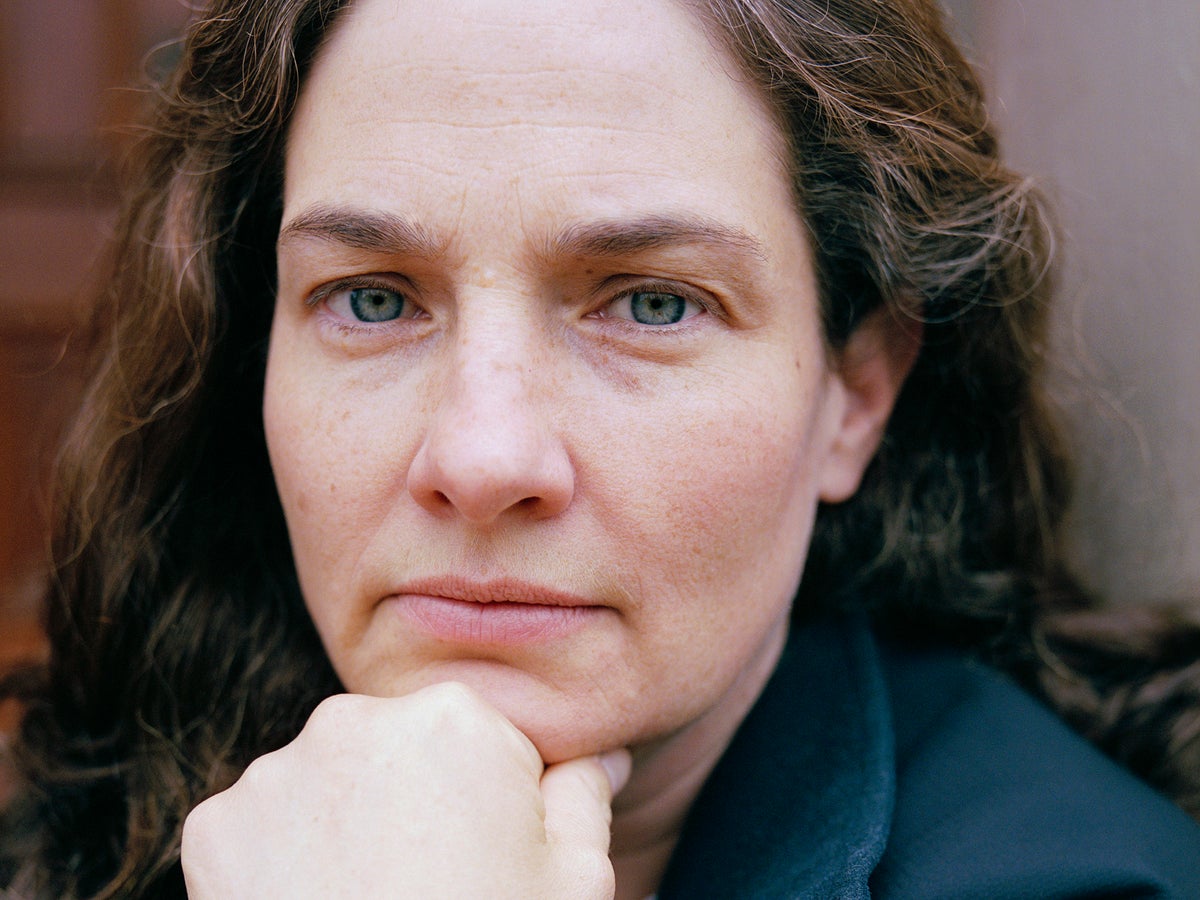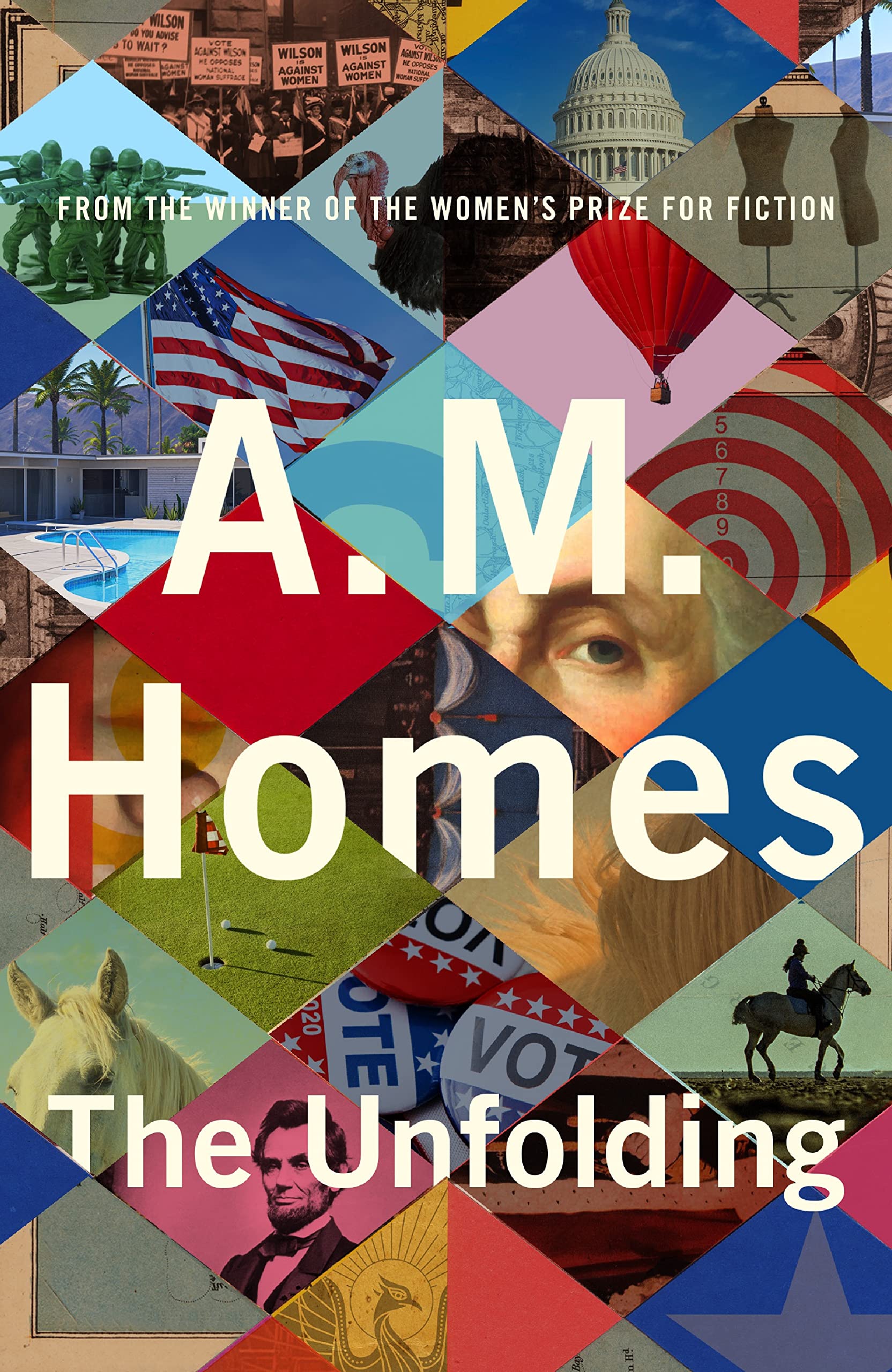
AM Homes is an early riser. This is entirely fitting for an author whose initials are suggestive of pre-noon activity. When we speak over FaceTime, it’s 8 o’clock in the morning where she is, in a studio she owns on Long Island, an hour’s drive from her home in Manhattan. This is where she comes to write, and she does not come alone. “I have this little friend with me,” she says, pointing to Grace, a Labradoodle-ish dog with fur the colour of ice cream cones. “She likes to go to the beach first thing.”
Homes, 60, is so gregarious a proposition on screen that the slim parameters of an iPhone can barely contain her. As she talks, she leans first this way then that, hair all over the place, and often she looms in for an extreme close-up, the sun glinting off her blue-tinted glasses. Born with the name Amy, she says she has always gone by AM, and that it’s what everyone calls her, “even my [college-aged] daughter”. When I ask what the M stands for, her reply is a deadpan fib: “Middle!”
For the past 30 years, Homes, one of America’s finest writers, has written terrifically propulsive – if often pointedly unsettling – fiction, and is someone whose literary themes seem to become reality shortly after writing them. One of her earlier novels, for example, 1999’s Music for Torching, features a school shooting. A few months after its publication came the Columbine tragedy, “which was our first big school shooting. Everyone was like: how did you do that? How did you know? But I just read the culture, I read the world, and so I see it coming.”
Her new novel, The Unfolding, her first in a decade, was formed in her mind several years before the election of Barack Obama and his unlikely successor, and essentially explains how one begot the other. “When I first started writing it, it did seem very far out,” she says, “but then, hey, it turned out to be real.”
The book takes place between Obama’s election win in November 2008 and his inauguration a few months later. It revolves around one American family: a wealthy Republican donor known as The Big Guy (Charlton Heston might have played him in the film adaptation had he been an enthusiast of cryogenics), his alcoholic wife Charlotte – who realises too late that she has wasted her life on her husband when she could have been forging her own identity instead – and their teenage daughter Meghan, desperately trying to swat away the naïve cocoon of her cosseted world. Each of them, for different reasons, is reeling after a presidential election in which the majority of Americans voted for someone whose middle name is “Hussein”.
Action is required, thinks The Big Guy, and so he brings together a cabal of similarly well-connected rich white men to undermine the incoming presidency by stealth; to bring back what they see as some kind of order, and sanity, to their country. Their plan is to “spread ideas like a virus”, but these ideas must be “comforting like peanut butter and jelly”. Even more, they need to harness the power of the average Joe. “There are millions of Joes in this country; we need to bring Joe into the fold. We have to tell him what to think. We remind him that in America, democracy is capitalism, guns and lower taxes.”
This is perfect territory for Homes: peering at her fellow Americans through a gimlet eye, and not always happy with what she sees. The Unfolding works brilliantly as a satire, but it’s also harrowing because it depicts the US as it is now: deeply divided, deeply problematical.
“Look, I’m a fiction writer, not a political historian,” she says, “but I do think it’s interesting that people think ‘I don’t know how we got here! What happened?’” What she means is that the subsequent election of Donald Trump was inevitable because America is full of people like The Big Guy. “What does it mean to these people that they’re losing power? What does it mean for them to finally realise that they might be an asshole? Not that they’ll do anything about that, but they’re noticing it now, perhaps for the first time.”
In one section of the book, The Big Guy belatedly realises that he’s always considered women to be second-class citizens. “I feel bad for these women,” he muses. “For the smart ones, wife and mother aren’t exactly the careers they had planned on. In retrospect, we should have encouraged them more.”
This willingness, in her novels, to speak as she finds, effectively to be critical of her fellow countrymen and women, means that Homes isn’t universally embraced in her homeland. Some are convinced she harbours anti-national sentiment. She doesn’t, she says. “But like I said, I look at the world around me, and I write what I see. Sexism and racism in America right now is very, very real.”
I suppose it would be much easier simply to be beloved by people – I could certainly use the ego boost! – but I just find it hard to write a super-light book
“When I think of Trump today,” she continues, “I still think that it didn’t happen, that we were just on a bad trip. I want to suck it all back up into the vacuum cleaner.” She adopts a voice like someone narrating a television advert: “‘Ever made a mess you can’t quite clean up? Try the Hoover 7000!’ You know, what came out of that time was that people started not playing by the rules any more, and that was suddenly OK. Some of those rules weren’t even written, because no one had ever thought to push those boundaries before. Previously, we’d comported ourselves, we’d played nice. Not now.” She clutches at her cheeks with her hands, fingers splayed. “It’s been very destabilising.”
AM Homes wrote her first novel, the coming-of-age tale Jack, at the age of 19 (it was published when she was 28). She grew up in Washington DC, the adopted daughter of an artist and a school guidance counsellor, but never wanted to become a writer; she wanted to be a rock star. “Specifically, I wanted to be in The Rolling Stones.” She played the drums, but The Rolling Stones already had a drummer. So she turned to fiction instead.
Given that so much of her work has made for deliberately uncomfortable reading, she’s enjoyed much commercial success. Her 1996 novel The End of Alice was a bestseller about a convicted paedophile who writes to a woman with similar proclivities, while 2006’s This Book Will Save Your Life told the tale of a wealthy trader who suffers an existential crisis and suddenly tries to be kind to others. That book was chosen for Richard and Judy’s Book Club, and went on to sell 360,000 copies. The maverick American film director John Waters said of it: “If Oprah went insane, this might be her favourite book.” Her last novel, 2013’s May We Be Forgiven, whose themes breached adultery, divorce and death, won the Women’s Prize for Fiction.
She can even make first-person narratives scandalous. After meeting her biological father in her thirties, she wrote a memoir, The Mistress’s Daughter, in which she imagined having sex with him.

“I don’t set out to be provocative,” she says. “I don’t think, ‘Oh, this is going to be good, I’ll push this button!’ But I do like to talk about things other people find difficult. I suppose it would be much easier simply to be beloved by people – I could certainly use the ego boost! – but I just find it hard to write a super-light book. I could never write a straightforward romance.”
And it’s this that makes her such a compelling writer, and one so very worth reading. She peels back the skin of the modern world, is horrified by what she sees, and then says to the rest of us: “Look.”
“I read newspapers, very often in the middle of the night,” she says, “and I read about what’s going on, and I worry. I feel – like our parents’ and grandparents’ generation – that we’re walking around befuddled by what’s in front of us. But then we’re in a funny place right now. We’re not the first wave of people who screwed up – it wasn’t us who put microplastics in everything – but we’re riding the wave of that screw-up.”
She frowns. “All this, to me, is super-interesting, but it’s also awful, and painful, and scary. It’s paralysing.”
‘The Unfolding’ is published by Granta







